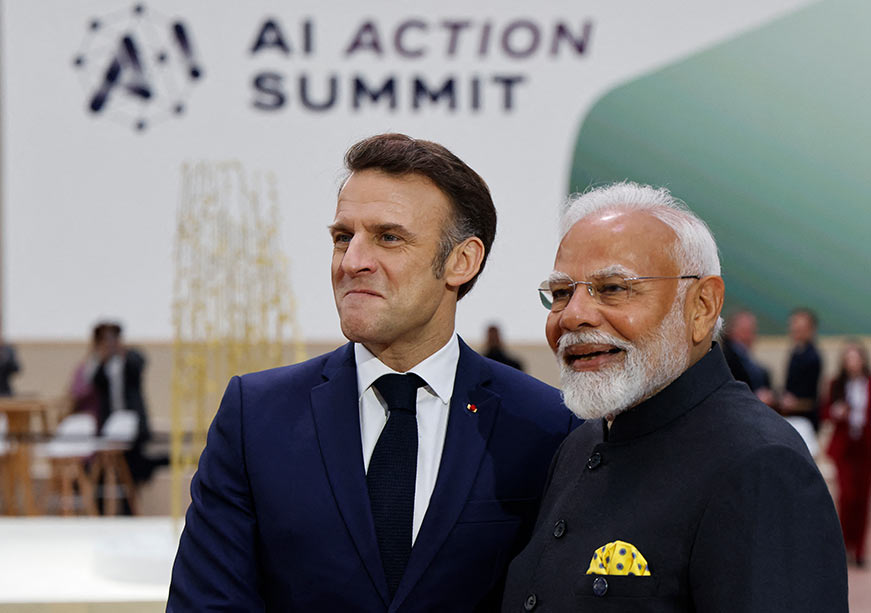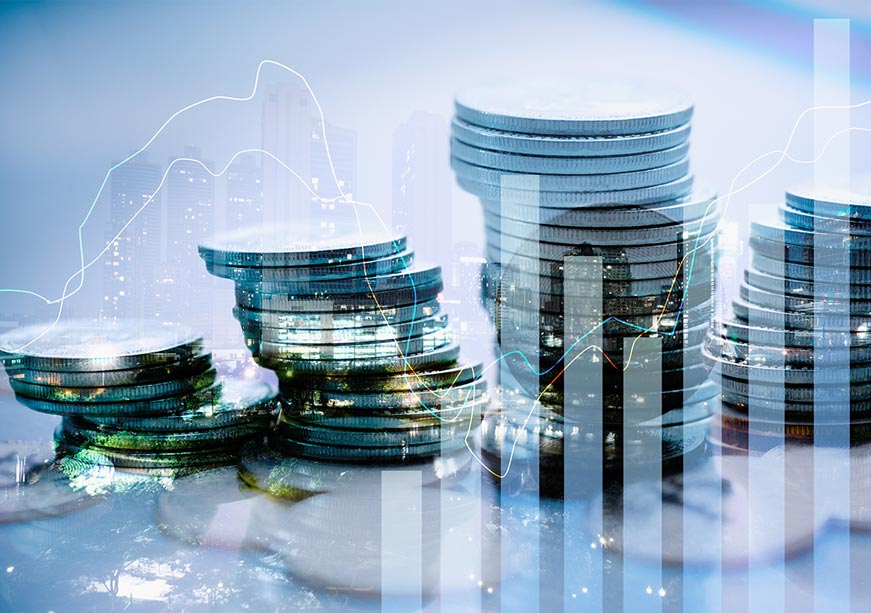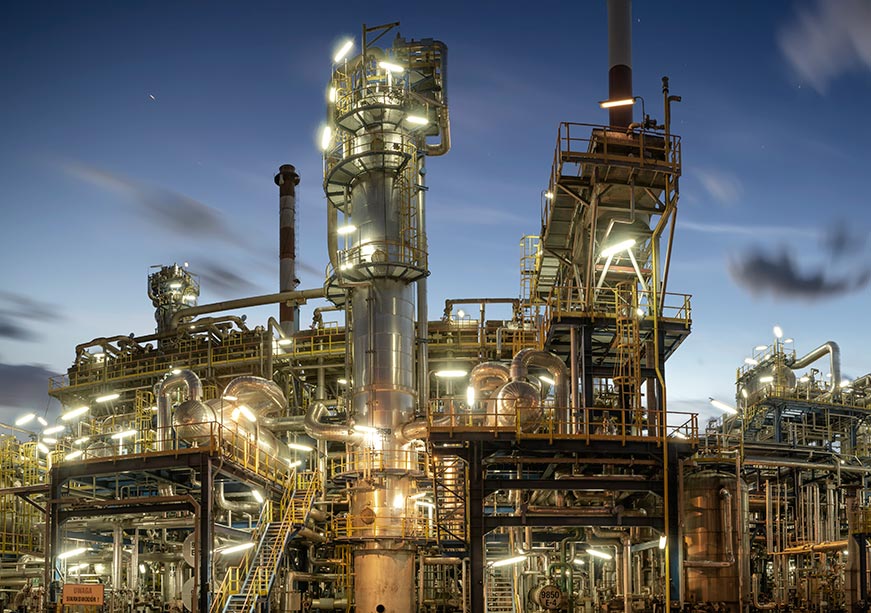-
CENTRES
Progammes & Centres
Location
Both India and France are guided by fiercely autonomous foreign policies that are paying their dividends in today’s transactional and volatile world

Image Source: Getty
Prime Minister Narendra Modi’s visit to France earlier this month, comprised two components — the Artificial Intelligence (AI) Action Summit, and a deepening of Indo-French bilateral ties. Building on the summits that took place in the UK and South Korea, the Paris Summit endeavoured to reinforce the development of AI research and applications for the public good.
In line with the human-centric framework advocated during its G20 presidency, India aims to distribute the benefits of AI equitably amongst its population, while advocating for the AI needs of the wider Global South. India’s National AI Mission draws from similar principles of openness and accessibility underpinning India’s successful Digital Public Infrastructure that is rapidly transforming its society and economy. The International Monetary Fund estimates that more Indians will use AI every day than in any other country before the end of this decade, making India central to any global framework on AI.
India’s National AI Mission draws from similar principles of openness and accessibility underpinning India’s successful Digital Public Infrastructure that is rapidly transforming its society and economy.
By partnering now on AI and launching an India-France AI Roadmap, the two countries are embarking on a joint path to shaping the future of responsible AI development, while also attempting to bridge the North-South AI divide. Combining both experiences, the two countries are also well-positioned to ideate solutions mitigating AI’s growing carbon footprint based on its high energy needs.
However, it’s important to keep in mind fundamental divergences in approaches. As a member of the European Union (EU), France adheres to the EU AI Act, which uses a risk-based approach to AI systems and is the world’s most comprehensive and stringent legislation so far on AI regulation. On the other hand, India is wary of over-regulation stifling its innovation ecosystem. Yet domestic debates demonstrate India’s willingness to adopt a regulatory framework on AI that balances the twin imperatives of safety and innovation while protecting individual rights. Here the European model offers a useful case study.
Bilateral discussions this time took place on Macron’s presidential aircraft from Paris to Marseille, where a new Indian Consulate was inaugurated. France, which last year appointed a Special Envoy to the India-Middle East-Europe Economic Corridor (IMEEC), has proposed Marseilles as the IMEEC’s gateway into European markets based on the city’s strategic location in the Mediterranean Sea. The two leaders visited the control centre of CMA-CGM, a Marseille-based logistics and shipping company that controls 11.5% of Indian shipping activity and has a 34-year-old presence in India. However, Marseille faces competition from the Trieste in Italy and Greece. Despite tensions in West Asia, geopolitical global uncertainties have only strengthened the case for alternative routes.
Defence and security have long remained the mainstay of the partnership. France is now amongst the top three customers of Indian defence equipment, and during this visit, India urged France to consider purchases of its Pinaka multi-barrel rocket launcher system. A defence industrial roadmap was launched in early 2024 aimed at the co-production of military equipment, critical to Indian indigenous defence production where France stands out as a country less hesitant to engage in technology transfers to India, coupled with contracts involving the P-75 Scorpene submarines, Rafale aircrafts and helicopter and jet engines. Security cooperation has also been on an upswing with the stopover of the French Carrier Strike Group Charles De Gaulle in India in January 2025 and in the form of joint exercises such as the Indian Navy’s involvement in multinational exercise La Perouse and the upcoming bilateral Varuna naval exercise scheduled for March. Deepening trilateral cooperation with Australia and the UAE in the military, maritime, energy, and health spaces was also emphasised along with development projects in third countries in the Indo-Pacific region.
France is now amongst the top three customers of Indian defence equipment, and during this visit, India urged France to consider purchases of its Pinaka multi-barrel rocket launcher system.
What is equally promising is that the contours of engagement for India’s oldest strategic partnership are rapidly moving beyond the traditional defence pillars to include trade, innovation, digitalisation, and people-to-people relations. Indian startups will now be included at the French Startup Incubator Station F, and 2026 is being officially hailed as the India-France Year of Innovation. Last year, France became the first European country to launch the Indian United Payments Interface (UPI), with the service starting at the Eiffel Tower. As the US gears to exit the Paris Agreement, Indo-French robust collaboration on climate and renewables can be further stepped up to fill the vacuum.
Paris and New Delhi are also expanding cooperation in the civil nuclear energy sector, particularly in Small and Advanced Modular Reactors, with a Special Task Force on Civil Nuclear Energy working towards this. Efforts are on towards building a nuclear power project in Jaitapur, Maharashtra. France derives 70% of its energy needs from nuclear sources, with the country producing the highest nuclear power per capita globally. With India aiming to substantially expand its nuclear energy capacity by 2047 in its transition towards a low-carbon economy, collaboration with France is a natural step forward.
With an India-France CEOs forum held in Paris, following a similar forum held in November 2024 in New Delhi, the two countries are trying to ramp up economic ties. The value of bilateral trade rose from $15 billion in the 2022-23 period to $20 billion in 2024. The joint statement mentions the need to increase the number of Indian students in France to 30,000 by 2030 -- currently 10,000 compared to Germany’s 35,000. At the same time, Paris may need to ensure a less hostile political environment for foreign students and immigrants.
Both India and France are guided by fiercely autonomous foreign policies that are paying their dividends in today’s transactional and volatile world, and an accelerating US-China strategic rivalry. A broadened India-France partnership can represent “a third way” away from such uncertainties.
This commentary originally appeared in Hindustan Times.
The views expressed above belong to the author(s). ORF research and analyses now available on Telegram! Click here to access our curated content — blogs, longforms and interviews.

Professor Harsh V. Pant is Vice President – Studies and Foreign Policy at Observer Research Foundation, New Delhi. He is a Professor of International Relations ...
Read More +
Shairee Malhotra is Deputy Director - Strategic Studies Programme at the Observer Research Foundation. Her areas of work include Indian foreign policy with a focus on ...
Read More +
